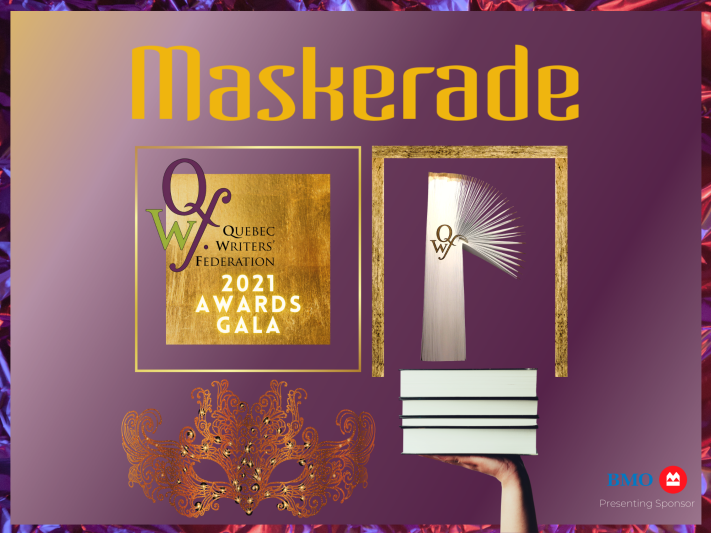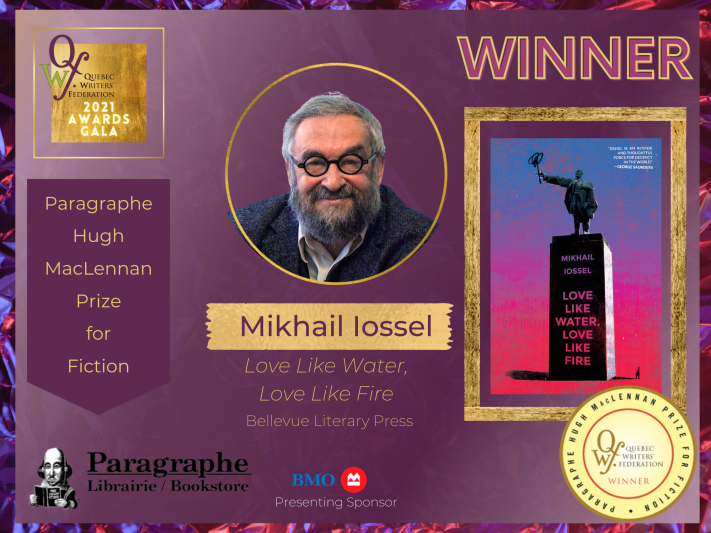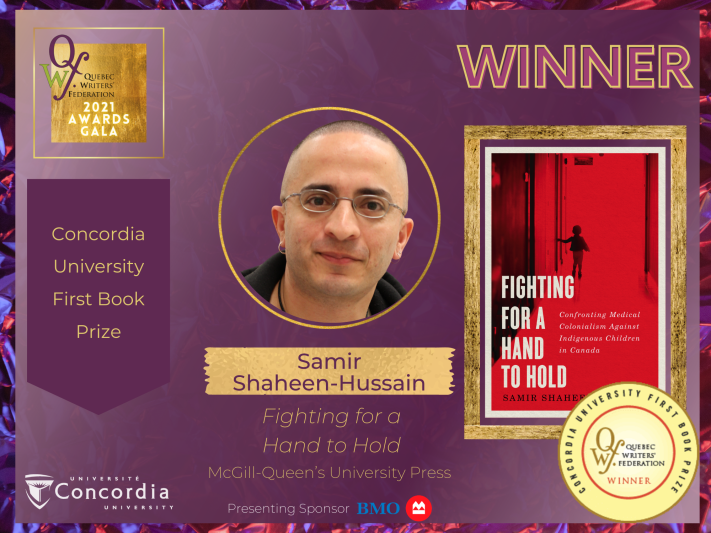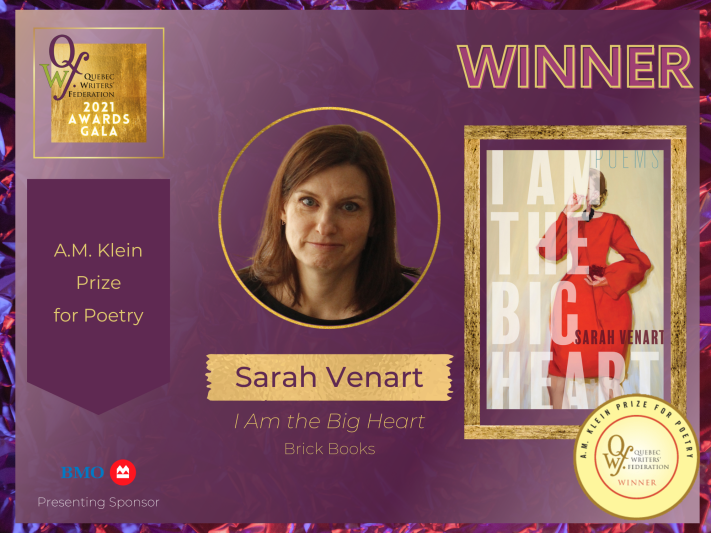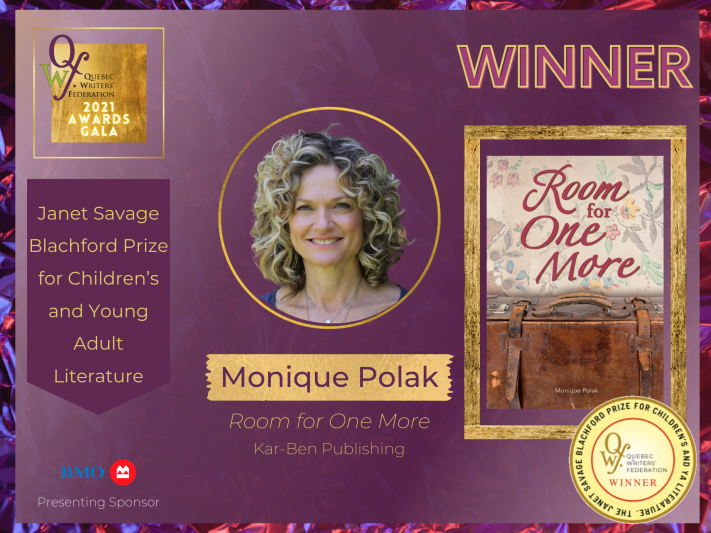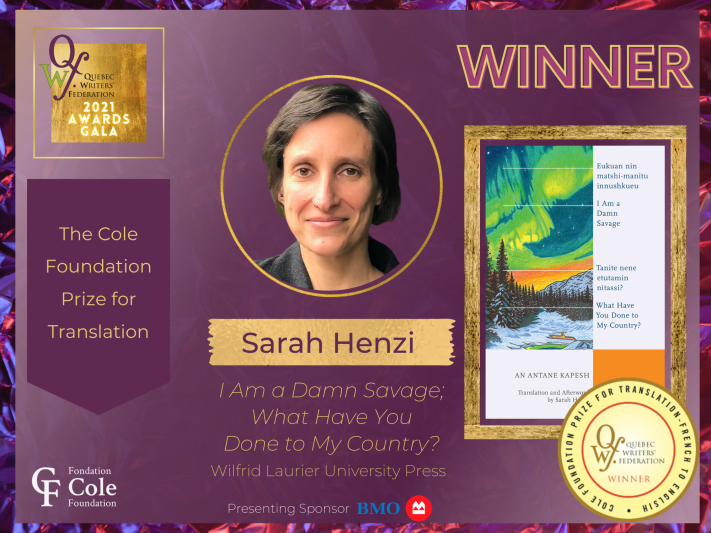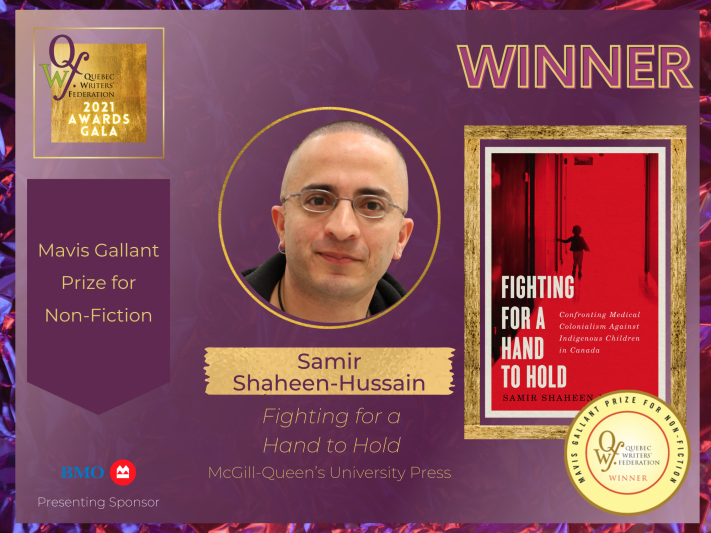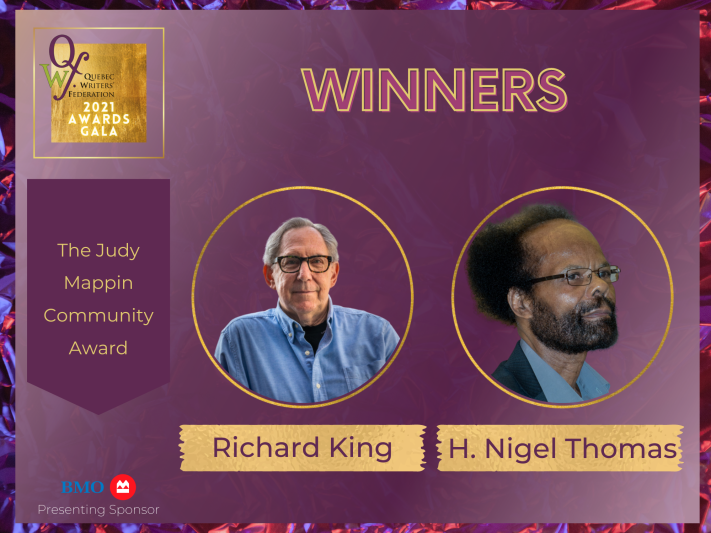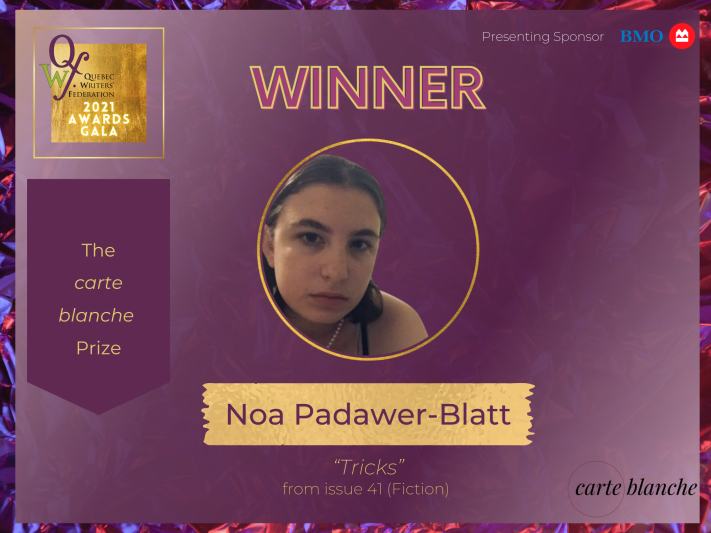A deeply researched and critical study of Canada’s health care services for Indigenous children by Samir Shaheen-Hussain won two of the Quebec Writers’ Federation (QWF) annual 2021 literary awards.
Fighting for a Hand to Hold: Confronting Medical Colonialism against Indigenous Children in Canada, was awarded both the Mavis Gallant Prize for Non-Fiction and the Concordia University First Book Prize.
Shaheen-Hussain’s Fighting for a Hand to Hold is “a necessary book,” wrote one juror, “not just for medical workers who provide care for Indigenous children, but for civil servants who proportion this care, and especially necessary for Quebec politicians who continue to deny systemic racism against Indigenous people and other racialized minorities.”
The author, a pediatrician and assistant professor of medicine at McGill, was a key organizer of a campaign that prompted the Quebec government to stop airlifting children from northern communities for treatment down south without a parent or caregiver present.
These awards and nine others were announced Wednesday, November 24, at a gala attended by Quebec’s English-language literary community, both online and in person, held at the Lion d’Or in Montreal.
You can watch a repeat of the Gala video here: WATCH THE GALA!
The complete list of winners is below.
Paragraphe Hugh MacLennan Prize for Fiction
Sponsored by Librarie Paragraphe Bookstore
Mikhail Iossel for Love Like Water, Love Like Fire
(Bellevue Literary Press)
Mikhail Iossel’s collection of short fiction about growing up a Soviet Jewish boy in Khrushchev’s Russia before immigrating to the United States and then, finally, to Montreal to be a professor of literature is harrowing, hilarious, dark, and devastating. “Moscow Windows” is the first long story in this collection of many brief stories set in the final decades of the Soviet Union. “It is a brilliant story, one of the best I have ever read,” said one juror. “It is surreal and realistic, enlivened by humour and irony.” Iossel’s sentences twist the reader through the illogical forces of dictatorship, childhood, puberty, survival, and writing angsty poetry in a communist regime.
Jury members: Heather Jessup, Ameen Merchant, Denis Sampson
Concordia University First Book Prize
Sponsored by Concordia University
Samir Shaheen-Hussain for Fighting for a Hand to Hold: Confronting Medical Colonialism against Indigenous Children in Canada
(McGill-Queen’s University Press)
In a provocative, accessible, and compelling narrative, Fighting for a Hand to Hold challenges how systematic racism created the decades-long practice of separating children from their families during emergency medical evacuations, and how settler-colonialism and genocide are in the infrastructure of Canada’s healthcare system. [This] is an important book that defines and confronts racism in all its nefarious forms: colonial systems, implicit bias, hidden curricula, forced sterilizations, residential schools, epistemic racism, and exclusion. A wake-up call for governments and the medical community.
Jury members: Seyward Goodhand, Nilambri Ghai, Shannon Webb-Campbell
A. M. Klein Prize for Poetry
Sarah Venart for I Am the Big Heart
(Brick Books)
These are carefully made and deeply felt poems that enact a mind sifting through memory, pausing here and there to pick out the glinting details that will unsettle description into discovery. A vulnerable and moving account of what it means to love and give care to others. The poems offer deeply observant reflections on their surroundings and circumstance. They are filled with love, but also longing for what is lost, or perhaps exiled, in the act of attending to others. These poems capture both the gifts and frustrations born out of sacrifice. From start to finish, this collection is an absolute joy to read. These poems span a moving gamut of experience and I found myself returning to them for their wit, wisdom, and dexterous craft.
Jury members: Gloria Macher, Nolan Natasha, Michael Prior
Mavis Gallant Prize for Non-fiction
Samir Shaheen-Hussain for Fighting for a Hand to Hold: Confronting Medical Colonialism against Indigenous Children in Canada
(McGill-Queen’s University Press)
In a carefully researched exposé, Shaheen-Hussain takes readers through the Canadian healthcare system and history and pulls back the curtain on the starring role played by Canada’s medical established order in preventable epidemics, in cruel medical experiments done on children, in forced sterilizations, in genocide, and in the ongoing oppression of Indigenous peoples. The book is well-documented, well-written in easy-to-read plain language with many down-to-earth, touching testimonies and case studies. The author, an activist fighting for equal and equitable medical care for young children against the heartless government bureaucracy and the powerful Minister of Health, provides the context to explain the inequalities in Quebec’s medical system. This book ought to be mandatory reading for anyone working in health care.
Jury members: William Dere, Ruth DyckFehderau, John Goddard
Janet Savage Blachford Prize for Children’s/Young Adult Literature
Monique Polak for Room for One More
(Kar-Ben Publishing)
Set in 1942, this is a poignant, sometimes painful, ultimately hopeful portrait of a Montreal girl’s learning of the German Jews’ lived experience during World War II. Polak’s love for young readers shows up on every page. Her writing style is “just enough”; she allows young readers to understand and learn about the horrors of the Second World War and the terror that the Jewish community endured in a way that respects their developmental stages, but pulls no punches with the shameful history of Canada’s intolerance and racism. An important story, delivered with aplomb.
Jury members: Natasha Deen, Darren Groth, Curran Jacobs
Cole Foundation Prize for Translation
Sarah Henzi for I Am a Damn Savage; What Have You Done to My Country?
(Wilfrid Laurier University Press)
A translation of Je suis une Maudite sauvagesse; Qu’as-tu fait de mon pays? byAn Antane Kapesh
(Mémoire d’Encrier)
A tremendous, careful undertaking much in the spirit of An Antane-Kapesh’s original texts—one of departures, of revivals, of urgent, vital dialogues. Meticulously assembled, corrected, and updated from the original Innu-to-French translations, Henzi presents a painstaking, transparent translation of these foundational Indigenous works. [These are] timeless, timely and tragic texts that cast a harsh yet important light on the lasting impact settlers have made on the Indigenous Peoples of the country we now call Canada.
Sarah Henzi’s masterful translation and insightful afterword carry a powerful voice and illustrate a commitment of rare depth to a text that deserves to be read far and wide. An invaluable, long-needed addition to the body of translated Innu works in English. The hard-hitting narrative harkens to First Nations oral tradition, unfolding between these pages in the original Innu and English translation side by side. This is an all too little-told tale, which speaks a truth every Canadian should know.
Jury members: David Bradford, Janice Flavien, David Warriner
Other Prizes awarded at the Gala
The QWF’s honorary 2021 Judy Mappin Community Award for outstanding contributions to English-language literature in Quebec was bestowed on bookseller Richard King, founder of Paragraphe Bookstore, and writer H. Nigel Thomas, whose teaching and founding of Kola magazine has been transformational for Black writers in Quebec.
The QWF College Writers Prize went to Julian Button-Nadon of John Abbott College for his short story, A Fisher’s Parade.
The carte blanche Prize for best contribution to QWF’s online magazine was awarded to Noa Padawer-Blatt, for Tricks (Issue 41).
